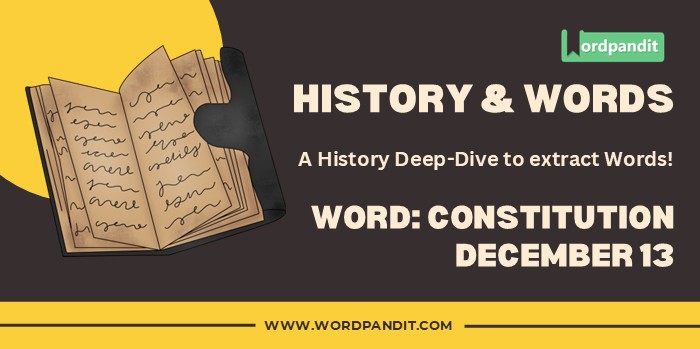History & Words: ‘Constitution’ (December 13)
Welcome to ‘History & Words.’ 🌟 I’m Prashant, founder of Wordpandit and the Learning Inc. Network. This series combines my passion for language learning with historical context. Each entry explores a word’s significance on a specific date, enhancing vocabulary while deepening understanding of history. Join me in this journey of words through time.
📚 Table of Contents
- Word of the Day
- Introduction
- Etymology
- Key Vocabulary
- Historical Context
- Timeline
- The Day’s Significance
- Quote
- Modern Usage and Reflection
- Legacy
- Comparative Analysis
- Did You Know?
- Conclusion
- Further Reading
🔍 Word of the Day: Constitution
Pronunciation: /ˌkɒnstɪˈtjuːʃən/ (kon-sti-TOO-shun)
🌍 Introduction
On December 13, 1937, events in Nanjing sparked profound changes in how nations approach constitutional law, particularly regarding human rights and wartime conduct. The aftermath of these events led to significant developments in international law and the constitutional frameworks that govern relations between nations.
The word “constitution” represents more than just a legal document; it embodies the fundamental principles by which a nation governs itself and interacts with other states. In the context of international relations, constitutions and constitutional law have evolved to address human rights, war crimes, and the protection of civilians during conflict.
🌱 Etymology
The term “constitution” derives from the Latin “constitutio,” meaning “arrangement” or “settlement,” from “constituere” (to establish or set up). This root combines “com-” (together) and “statuere” (to set up), reflecting the idea of establishing fundamental principles that bring people together under common laws.
📖 Key Vocabulary
- 🔑 Sovereignty: The authority of a state to govern itself and determine its own laws.
- 🔑 Jurisdiction: The official power to make legal decisions and judgments.
- 🔑 International Law: The system of rules recognized by nations as binding in their relations.
- 🔑 Human Rights: Fundamental rights considered inherent to all human beings.
- 🔑 Rule of Law: The principle that law should govern a nation rather than arbitrary decisions.
🏛️ Historical Context
The concept of constitutional governance has ancient roots, from Hammurabi’s Code to the Magna Carta. These early documents established principles of governance and human rights that would influence modern constitutional thought.
The 20th century brought unprecedented challenges to constitutional law, particularly in addressing international conflicts and human rights violations. The events of World War II catalyzed the development of new international legal frameworks and institutions.
The post-war period saw the emergence of international conventions and treaties that established new constitutional principles for the global community, including the Universal Declaration of Human Rights (1948) and the Geneva Conventions.
⏳ Timeline
- 1215: Magna Carta signed in England.
- 1787: U.S. Constitution drafted.
- 1919: Treaty of Versailles establishes League of Nations.
- 1937: December 13 events in Nanjing.
- 1945: United Nations Charter signed.
- 1948: Universal Declaration of Human Rights adopted.
- 1949: Geneva Conventions revised.
- 1998: Rome Statute establishes International Criminal Court.
🌟 The Day’s Significance
December 13, 1937, marks a turning point in international constitutional law. The events in Nanjing highlighted the need for stronger international legal frameworks to protect civilian populations and prevent war crimes.
These events contributed to the development of new constitutional principles in international law, including the concept of crimes against humanity and the responsibility to protect civilian populations during wartime.
The legacy of this date continues to influence modern constitutional law, particularly in areas of human rights protection and international criminal justice.
💬 Quote
“Laws must be justified by something more than the will of the majority.” – Learned Hand, American judge and judicial philosopher
🔮 Modern Usage and Reflection
Today, “constitution” encompasses both domestic governance and international legal frameworks. Modern constitutions increasingly incorporate principles of human rights protection and international law, reflecting lessons learned from historical events.
🏛️ Legacy
The evolution of constitutional law in response to historical events has strengthened international legal frameworks and human rights protections. These developments continue to shape how nations interact and how the international community responds to conflicts.
🔍 Comparative Analysis
While traditional constitutions focused primarily on domestic governance, modern constitutional frameworks increasingly address international obligations and human rights protections, reflecting a more interconnected global community.
💡 Did You Know?
🎓 Conclusion
The word “constitution” reflects humanity’s ongoing effort to establish just and lawful governance systems. The events of December 13, 1937, contributed to significant developments in international constitutional law, leading to stronger protections for human rights and clearer frameworks for addressing violations of international law.
📚 Further Reading
- 📘 “The Evolution of International Human Rights” by Paul Gordon Lauren
- 📗 “Constitutional Law and International Law” by Louis Henkin
- 📙 “The History of Global Constitutionalism” by Duncan B. Hollis











